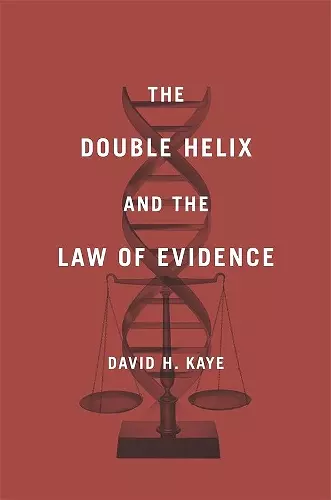The Double Helix and the Law of Evidence
Format:Hardback
Publisher:Harvard University Press
Published:31st Jan '10
Currently unavailable, our supplier has not provided us a restock date

This unique history of the forensic use of genetic testing, and the controversies from the earliest days to the present, is both accurate and intelligible. An acknowledged authority in the field, David Kaye uses striking case histories and excellent analogies to make the scientific issues clear to a nonspecialist. It is an impressive achievement. -- James F. Crow, University of Wisconsin-Madison From the intricacies of genetics and statistics, to the niceties of the law of evidence, Kaye's sure grasp of the field has produced a fascinating critical history, though one in which the technical details never become overbearing. Both lawyers and forensic scientists will learn much from Kaye's diligent work. -- Mike Redmayne, London School of Economics and Political Science A cogent, fascinating history of the scientific and legal history of the most important breakthrough in the history of forensic science--DNA evidence. -- David E. Bernstein, George Mason University School of Law
Essential reading for lawyers, judges, and expert witnesses in DNA cases, this book is an informative contribution to the interdisciplinary study of law and science. Bridging law, genetics, and statistics, it provides an authoritative history of the long and tortuous process by which DNA science has been integrated into the American legal system.Bridging law, genetics, and statistics, this book is an authoritative history of the long and tortuous process by which DNA science has been integrated into the American legal system. In a history both scientifically sophisticated and comprehensible to the nonspecialist, David H. Kaye weaves together molecular biology, population genetics, the legal rules of evidence, and theories of statistical reasoning as he describes the struggles between prosecutors and defense counsel over the admissibility of genetic proof of identity. Combining scientific exposition with stories of criminal investigations, scientific and legal hubris, and distortions on all sides, Kaye shows how the adversary system exacerbated divisions among scientists, how lawyers and experts obfuscated some issues and clarified others, how probability and statistics were manipulated and misunderstood, and how the need to convince lay judges influenced the scientific research. Looking to the future, Kaye uses probability theory to clarify legal concepts of relevance and probative value, and describes alternatives to race-based DNA profile frequencies. Essential reading for lawyers, judges, and expert witnesses in DNA cases, The Double Helix and the Law of Evidence is an informative and provocative contribution to the interdisciplinary study of law and science.
This unique history of the forensic use of genetic testing, and the controversies from the earliest days to the present, is both accurate and intelligible. An acknowledged authority in the field, David Kaye uses striking case histories and excellent analogies to make the scientific issues clear to a nonspecialist. It is an impressive achievement. -- James F. Crow, University of Wisconsin–Madison
From the intricacies of genetics and statistics, to the niceties of the law of evidence, Kaye's sure grasp of the field has produced a fascinating critical history, though one in which the technical details never become overbearing. Both lawyers and forensic scientists will learn much from Kaye's diligent work. -- Mike Redmayne, London School of Economics and Political Science
A cogent, fascinating history of the scientific and legal history of the most important breakthrough in the history of forensic science—DNA evidence. -- David E. Bernstein, George Mason University School of Law
The scope of Kaye's analysis, his insightful and meticulous eye for detail, the coverage of both law and science (not forgetting the math), and the spicing with human tales of crimes and academic rivalries combine to ensure the book will interest a medley of readers. As Kaye points out in his introduction, the power of DNA technology is now beyond dispute. However, media portrayals of this power are often inaccurate, while those professionals tasked with employing the technology may not possess a competent understanding of its actual strengths and limitations. The book could go a long way toward correcting these failures, were it to become essential reading for reporters, criminal investigators, legal professionals, and, ultimately, the public—who are most often characterized as demanding the increased use of DNA evidence by law enforcement. Further, Kaye's account may help forensic scientists who do not work with DNA to better understand the trials and tribulations that were weathered by forensic DNA profiling on the 'far from smooth' road to legal acceptance. With DNA hailed as the gold standard of forensic science, Kaye presents a lesson that bears learning by those disciplines or techniques currently struggling to sustain their integrity as a science and gain, or maintain, legal acceptance. DNA profiling did not become the gold standard overnight, and even gold can be tarnished if mistreated or mishandled… If we are to realize the full forensic potential of DNA to improve detection rates, convict the guilty, and exculpate the innocent, then everyone involved in the use of DNA profiling needs a proper appreciation of the technology's history, strengths, and weaknesses. This is what The Double Helix and the Law of Evidence provides… May the book get the wide readership it deserves. -- Carole McCartney * Science *
Kaye is a law professor renowned for his meticulous attention to detail, careful argumentation and impressive technical mastery of statistical and scientific issues… The Double Helix and the Law of Evidence offers a detailed, authoritative accounting of the legal cases of this period and of scientific debates that ran in parallel in the pages of scientific journals. -- Simon A. Cole * American Scientist *
- Nominated for James Willard Hurst Prize 2010
- Nominated for David J. Langum, Sr. Prize in American Legal History or Biography 2009
- Nominated for Littleton-Griswold Prize 2010
- Nominated for John Phillip Reid Book Award 2010
ISBN: 9780674035881
Dimensions: unknown
Weight: unknown
352 pages